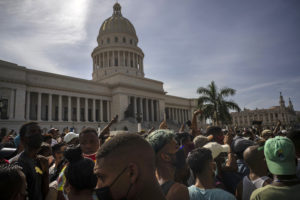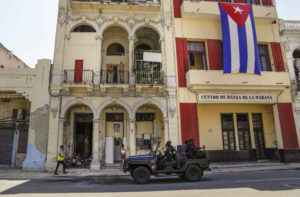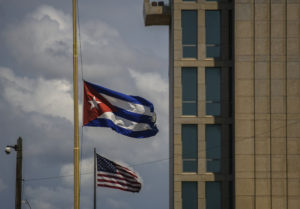To read a pdf version of this memo, please click here.
In late October 2014, WOLA staff led a four day research trip to Cuba with U.S. labor union leaders and labor experts to look at the changing Cuban economy and how the economic reforms have impacted worker protections on the island. It was the fifth in a series of trips that are intended to open dialogue between the U.S. labor movement and the Cuban trade union structure and examine how changes in economic policy present new challenges and opportunities to the labor relations system and worker protections.
On this most recent trip, we visited the first wholesale agricultural market in Cuba, where state farms, agricultural cooperatives, and private farmers sell their goods to individual buyers for use in private and state-run restaurants, hotels, cafeterias, and the like. In other meetings, we met with international affairs staff of the Cuban trade union federation (Central de Trabajadores de Cuba, CTC); the president of the health care workers’ union; officers of a local union representing workers in the tourist sector in Old Havana; and officials representing self-employed and small business owners who have joined the union of retail workers.
In addition, we met with several officials from religious organizations, the owner of a small business in the town of Matanzas, and others who offered a variety of perspectives on the changing Cuban economy. Our visits and discussions showed the progress that Cuba has made, as well as the challenges that the government and worker organizations face in moving toward a more productive, mixed economy while maintaining the social protections that Cubans have experienced.
Wholesale Markets and Cooperatives
Our visit to El Trigal, the first wholesale produce market in Cuba, provided a glimpse of Cuba’s future mixed economy. El Trigal is located on the outskirts of Havana and opened in December 2013. In the market, we saw evidence of the emerging role of non-state cooperatives and the growing importance of market, rather than central planning mechanisms, in distributing agricultural goods to both private and public enterprises. At the same time, in our meeting with the managers of El Trigal, we were struck by the fact that even as the economy incorporates greater market incentives—competition, individual initiative and private profit—Cubans participating in the new sectors of the economy remain committed to a strong sense of social solidarity.
The agricultural economy and wholesale markets
Until very recently, there were no wholesale markets in Cuba. Previously, all agricultural producers—be they state-run farms, private cooperatives, or individual farmers—entered into contracts with the state to produce a quota at an agreed upon price. Products were turned over to a centralized warehousing system and then distributed to state restaurants, cafeterias, markets, and hotels based on a central planning system. In 1993, as part of a series of limited economic liberalization measures meant to jump-start the faltering economy, the government began to allow farmers or their intermediaries to privately sell their surplus on the open market. Retail agricultural markets called agropecuarios emerged. Resembling farmers’ markets in the United States, agropecuarios consist of private vendors that sold to individuals, as well as buyers for small private restaurants. But the sale of products to businesses at wholesale prices was still forbidden. State-run restaurants, cafeterias, and hotels continued to get a fixed quota of farm products from the state distribution warehouses.
In response to declining agricultural output, two sets of changes have been put in placeover the last few years. First, the Cuban government has substantially expanded opportunities and incentives for small farmers, cooperatives, and state farms and has offered land leases to attract more people to the agricultural sector. Farm goods prices have also been allowed to rise by reducing the quota system and increasing the extent to which farms can sell directly to agricultural markets, private hotels, restaurants, and other purchasers.
At the same time, the Cuban government has expanded the number of economic actors who buy agricultural products. Opportunities for self-employment have grown, and the number of small businesses that buy agricultural products, such as private restaurants and casas particulares—essentially bed-and-breakfasts run out of peoples’ homes—has increased dramatically. The government has also begun to transform some previously state-owned enterprises into worker-owned cooperatives. Weeks before our delegation visited Cuba, Deputy Trade Minister Aida Chávez said the state would sell off the country’s 8,984 state-owned restaurants in a gradual process starting in 2015, thereby shifting even more workers into the nascent food services private sector.
The result of all of these changes is an expanding demand for wholesale food markets where both privately and state-owned restaurants, hotels, and cafeterias can buy in bulk. El Trigal is the first response to this demand. It is a huge, open air space. The managers told us they move 6000 tons of agricultural products every week. We could see the signs of dynamic commercial activity everywhere: we watched as buyers for hotels, public and private restaurants, and others placed orders with sellers, and produce was bundled and loaded onto the trucks moving in and out of the market.
El Trigal is certainly a step in the right director in terms of meeting the needs for wholesale purchases by both private and publicly owned enterprises. However, other problems remain. The emerging system of market-driven agricultural sales hasn’t yet generated enough productionto drive prices down for either consumers or enterprises, although the production of some goods has increased. Cuba’s agricultural system still falls far short of its goals for production, and the country continues to import close of 80 percent of its food needs. As a result, prices of agricultural goods sold both at El Trigal and at the retail agropecuarios remain considerably higher than the prices of government-subsidized staples that last most families two to three weeks out of the month.
Cuba has a great deal more to do to solve its agricultural production and distribution problems. But the open air cooperative wholesale market is catering to a previously unmet need for connecting private producers and to consumers. It likely will become a model upon which other wholesale or farmer’s markets are based in the future.
El Trigal as a cooperative
El Trigal is exceptional not only for its status as the country’s lone wholesale produce market, but also for its status as one of the country’s first cooperatively managed enterprises outside of farms and agricultural production. The Cuban government views non-farm cooperatives as a way to shift ownership of enterprises from the state to the private sector. While initial results have been mixed, most cooperativesreport increased profitability and efficiency after making the switch from state-run to privately owned cooperatives.
El Trigal wholesale market
is managed by a cooperative that leases the warehouse space from the government. It charges a fee to individual produce sellers. In exchange for these fees, the cooperative handles the supervision and management of the space. Individual vendors set their own prices for their goods.
El Trigal has thirteen cooperative partners. Each get a share of the profits from the enterprise; in a meeting, the cooperative managers told us they were earning, on average, about five times the salary they had previously made as employees in the state agricultural distribution system. The cooperative also employs contracted cleaners who earn about three times the annual salary of employees who do similar jobs in the state sector.
If the cooperative members embody a new employment system in Cuba, they retain visible political commitments. The cooperative members in our meeting ended the discussion with a plea to us to do what we could to improve U.S.-Cuban relations and to help win the freedom of the Cuban Five; to that end, they handed us a letter, which they wrote and signed themselves, and asked us to deliver it to the White House.
Labor Protections in the New Economy
One of the questions that WOLA has followed for several yearsis what will happen to labor protections as the Cuban economy changes. We have closely examined the Cuban labor relations system, which is unique in many ways. While wages in Cuba are low, its Labor Code writes extensive social protections such as generous parental leave, old age pensions, universal health care, unemployment insurance, and the like into law. It is also distinct in that most people work in the public sector and have formal trade union representation. The only recognized trade union federation—the CTC—does very little collective bargaining, instead playing a complicated political role in which it reflects the interests and concerns of its members in the government councils that set wage levels and working conditions. It also transmits to its members the priorities of the political leadership bodies in which it participates.
This system is far from ideal from a labor rights perspective. With only one legally recognized union, workers can neither select which union they want to represent them, nor organize to replace one union with another when the union appears unresponsive or too close to management. That said, it worked reasonably well in the period through the late 1980s, a period in which most Cubans were employed by the state, the economy was growing, and working conditions for most were improving.
But in the face of economic stagnation, Cuba has increasingly embraced a new and still undefined economic model, which has a private sector; a growing role for foreign investment; and increasingly decentralized state enterprises. In such a context, the old labor relations model may no longer serve the interests of workers, and the broader social role that unions have played may need to be redefined.
For example, today, state-run enterprises have greater autonomy. The logic behind devolving decision-making from government ministries down to enterprise management teams is that it might result in more rational and informed decisions and unlock greater efficiency and productivity that will benefit the economy overall. As part of this process, these newly autonomous state enterprises are getting greater latitude in setting wages, incentives, and working conditions. However, it remains unclear how managers will implement this greater enterprise level flexibility. Will they unilaterally implement changes? Will they consult or negotiate with workers and their representatives at the enterprise level? Will they be required to take into account workplace safety and health issues, existing wage scales, promotion policies, and other issues that matter to workers?
It also remains unclear how the current worker organizations will represent workers in these decentralized enterprises. In the past, these matters were settled at a national-level council in which trade union leaders participated. In this new context, how will worker interests be represented? Will the trade unions at the enterprise level negotiate wages, incentives, and working conditions? Are local officers being trained or prepared for this task? What will be the mix of political advocacy and collective bargaining that unions or other worker organizations take up in wage setting or work place safety?
The growth of the private sector presents another challenge. As the private sector grows, the CTC has sought to organize the self-employed into sectors of the unions in the industries in which they are functioning (the food service and restaurant union, the retail sales union, and so on). But the interests of the emerging entrepreneurial sector are more like those of a chamber of commerce: their demands include items such as appropriate regulatory frameworks and services from the municipal government. Are these needs really best served in a trade union framework? On a previous visit, we had seen that the union representing self-employed vendors in the crafts market in Havana had advocated effectively with the municipal government for better utilities and other services for the vendors. Will this, over time, be an appropriate set of functions for a trade union?
One private restaurant owner we met with mentioned that he is able to pay his employees more than what they would receive at a state-run enterprise and has been able to retain nearly all his employees for the two years he has been in business. While he is part of the private sector union and he believes that it plays an important role, he believes it will get better at representing the interests of the self-employed with time and greater numbers of participants.
In the meantime, the new private sector union currently consists not only of the self-employed, but also of small business owners that have employees, as well as those employees. Data released by the Cuban National Office of Statistics (Oficina Nacional de Estadísticas, ONE) suggest that about 15 percent of those that the government classifies as “self-employed” are actually employees working for a small business owner. This sector is likely to grow significantly over time.
How will the rights and social protections of those employees be guaranteed? How will they be represented, when their employers themselves belong to the union? These are new questions in Cuba. Similar queries will emerge in the cooperative sector and in enterprises run as joint ventures or wholly owned foreign investments.
Last December, Cuba’s National Assembly approved a new labor codethat attempted to answer some of these questions. The new Labor Code has changed the legal framework significantly. In our meetings with a group of self-employed individuals we were briefed on how small businesses pay into a social security fund for themselves and their employees. This fund covers the costs of participation in the universal health care system, the retirement system, and other worker benefits, such as unemployment and parental leave. Additionally, the representatives of the private sector workers that we spoke with said after a three month grace period they must pay an income tax, something that has not happened in Cuba since the early 1960s.
These are important development. They signal recognition that there is an emerging stratum of private sector employees and that they need social protections. They also suggest that these employees will not simply be left to the mercy of the market, as has happened in the process of change in other state-run econ
omies moving toward a mixed model.
On the other hand, the year-long employment contract is at odds with the employment-at-will model dominant in the United States. As some observers have noted, it imposes rigidities on the new business sector. But is also signals that as the Cuban economy changes, the government and decision-making bodies are seeking ways defend the social protections that Cuban workers had in the past.
These advances take place mostly in the context of the changes in Cuba’s labor code. Workers had input on these changes in enterprise-level meetings in the run up to the Cuban National Assembly’s approval of the code last year and the institutional structure of the CTC had input as well. But to date, the changes have been much more in the legal and regulatory framework of the Cuban state. Whether the CTC, which consolidated itself in an era of state employment and institutionalized channels for trade union input, can now adapt itself to a new era and a new role, with a variety of economic forms, and new demands for worker representation, remains to be seen.
Geoff Thale is WOLA’s Program Director. Marc Hanson is WOLA’s Senior Associate for Cuba.



